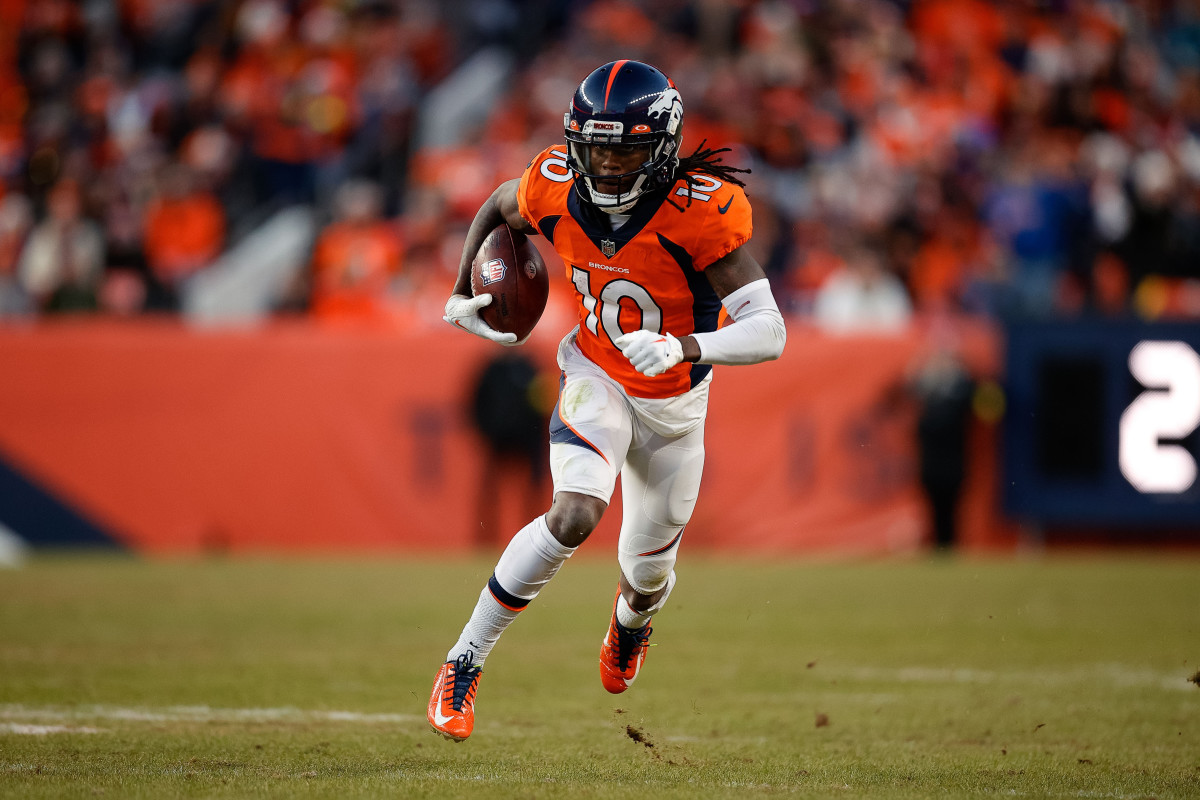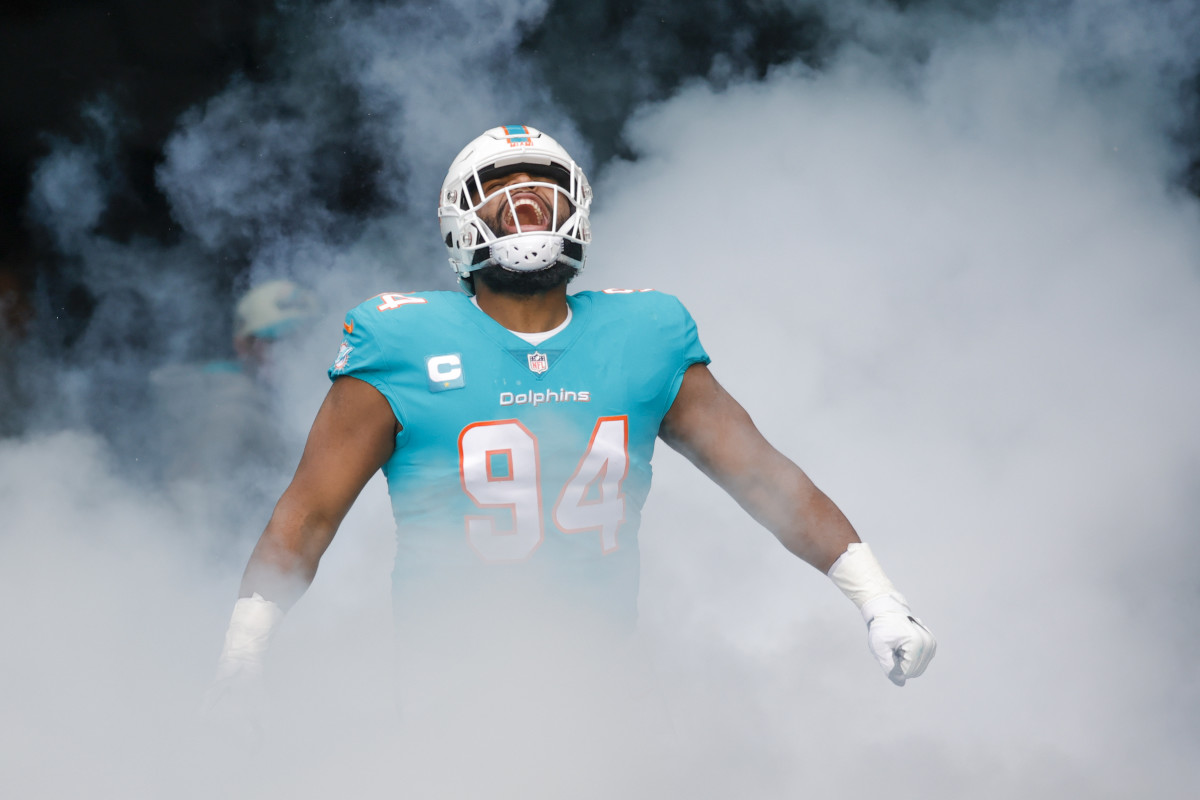The Most Important Roster Decision for Each AFC Team to Make Before Training Camp

With most teams already accounting for post–June 1 cuts, there might not be any surprises in the first month of the summer.
Over in the AFC, teams are more concerned about getting contract extensions done with cornerstone players before the start of training camp. Perhaps no teams are more in a hurry than the Bengals and Chargers, as Joe Burrow and Justin Herbert are due for massive contract extensions after establishing themselves as two of the best quarterbacks in the league since entering it in 2020.
There is also a handful of defensive tackles looking to cash in before the season, and there might be a few surprise trades in the coming weeks.
We assessed each team in the AFC to narrow down their most important roster decisions ahead of the post–June 1 cuts and training camp report dates. Here’s how each shakes out for the AFC teams.
Watch the NFL with fuboTV. Start your free trial today.
Baltimore Ravens: Ben Cleveland
After losing Ben Powers in free agency, the Ravens will need to decide on a starting left guard this summer. Cleveland, a 2021 third-round pick, appears to be the front-runner, but Ravens coach John Harbaugh called it a four-way competition with Patrick Mekari, John Simpson and Daniel Faalele. If Baltimore is looking to create cap space, the team would save $4 million by cutting Mekari post–June 1. Cleveland, who has only five career starts, was drafted to eventually become a starting guard, but it seems the Ravens are going to make him earn it in training camp.
Buffalo Bills: Nyheim Hines
The Bills have only about $1.4 million in cap space, so they might be looking to create breathing room by cutting one of their four running backs on the depth chart. James Cook is safe after a promising rookie season in which he rushed for 507 yards. In 2023, Cook will need to be a consistent playmaker again after the team struggled to run the football last year, forcing quarterback Josh Allen to take more carries. The Bills also added Damien Harris in free agency to form a one-two punch with Cook. Latavius Murray just signed a one-year deal with Buffalo earlier this month, perhaps making Hines the odd man out. The team would save $2 million by making Hines a post–June 1 cut.
Cincinnati Bengals: Joe Burrow
Signing Burrow to a contract extension is the biggest priority for the Bengals. The quarterback recently told reporters, “I’m pretty clear on what I want,” adding that he and the team are “on the road to making that happen” (a strong indicator that a deal could get done before the season). It’s likely Bengals fans will have nothing to worry about on this front, and it might just be a waiting game, with another franchise quarterback in L.A. also looking to get paid.
Another notable roster decision the Bengals are likely mulling over is whether to ask Joe Mixon to take a pay cut, or save $10 million on the salary cap by making the running back a post–June 1 cut. One factor in the decision might be Mixon’s off-field concerns after Cincinnati Police re-charged him with aggravated menacing.
Cleveland Browns: Greg Newsome II
Last month, Newsome denied reports about requesting a trade from Cleveland, saying that switching agents was for personal reasons and not because his previous one couldn’t execute a trade. Regardless of whether Newsome wanted out, the 2021 first-round pick has plenty to prove during a pivotal third season, as the Browns will need to decide next year whether to pick up Newsome’s fifth-year option. After struggling as a slot cornerback, perhaps Newsome finds a better role that suits his strengths with new defensive coordinator Jim Schwartz.
Denver Broncos: Jerry Jeudy

This will be a make-or-break year for Jeudy in Denver. Rumors swirled about Jeudy possibly being traded before the NFL draft, and it didn’t help his cause that the team used its first pick in the draft to select a wide receiver (Marvin Mims at No. 63), despite already having a logjam at the position with Tim Patrick, Courtland Sutton, KJ Hamler and Marquez Callaway. Jeudy, a 2020 first-rounder, has posted modest numbers since entering the league—he hasn’t cracked 1,000 receiving yards in a season—and now will have to prove to new coach Sean Payton that he’s a valuable building block for the organization instead of a trade chip.
Houston Texans: Tytus Howard
Howard, a 2019 first-round pick, is entering the final year of his rookie deal and could be in line for an extension this summer after displaying improvements in ’22. (He gave up only three sacks and five quarterback hits.) But the Texans might wait until next year after already working out extensions with left tackle Laremy Tunsil and offensive guard Shaq Mason this offseason. On the other hand, it might be wise for Houston to lock down its core offensive-line group, to shift the focus onto the development of rookie quarterback C.J. Stroud.
Indianapolis Colts: Ryan Kelly
The Colts probably aren’t leaning toward releasing Kelly, because it could hinder the development of rookie quarterback Anthony Richardson, the No. 4 pick in the draft. But after Kelly’s forgetful 2022 season, the team might be considering the option of cutting him post–June 1 to save $10.1 million, according to Over the Cap. Kelly, 29, allowed five sacks, 17 hurries and 25 pressures last season. Overall, it was a season to forget for the Colts’ offensive line, including for Pro Bowl left guard Quenton Nelson. Indianapolis’s talented offensive line needs a bounce-back season to help Richardson find his footing this season.
Jacksonville Jaguars: Evan Engram
Engram is scheduled to play on a one-year, $11.3 million franchise tag, unless he and the Jaguars agree on a multiyear contract extension before the league’s July 17 deadline to negotiate with players under the tag. Engram was instrumental in the development of quarterback Trevor Lawrence during his first season in Jacksonville, as the tight end contributed 73 catches for 766 yards and four touchdowns in 2021.
Kansas City Chiefs: Chris Jones
Jones is due for a contract extension after a monster 2022 season, with one year left on his current deal that has a base salary of $19.5 million with no guaranteed money, according to Over the Cap. Jones played better than Rams defensive tackle Aaron Donald last season, but the Kansas City tackle likely won’t match Donald’s average annual salary of $31.6 million. Jones, however, does have a strong case to match Jeffery Simmons’s new deal, a four-year, $94 million contract extension with the Titans. Jones is turning 29 in July, but he’s also coming off a career season in which he earned a 92.3 defensive grade from Pro Football Focus.
Las Vegas Raiders: Josh Jacobs
Jacobs is another franchise-tagged player looking for a long-term commitment. But the 2022 rushing champion has an uphill battle, with the running back position no longer viewed as a priority. It wouldn’t be a surprise if Jacobs decided to “hold in” during training camp in an attempt to get more financial security before allowing the team to add more wear and tear on his body. Last season, Jacobs racked up a career-high 340 carries, a drastic jump from his previous high of 273 in ’20.
Los Angeles Chargers: Justin Herbert
Herbert is next in line to get paid among star quarterbacks. There’s no excuse for the Chargers not to get a deal done this summer, especially after the Eagles and Ravens provided the blueprint by locking down Jalen Hurts and Lamar Jackson this offseason, respectively. Herbert, the 2020 No. 6 pick, will likely surpass Jackson’s average annual salary of $52 million. The bigger questions will be how many years and how much guaranteed money Herbert will command. (Jackson received $135 million fully guaranteed, substantially less than Deshaun Watson’s fully guaranteed deal of $230 million.) Time is ticking on the Chargers to get a deal done before training camp, and the price might go up if Burrow and the Bengals get antsy to announce a new deal.
Miami Dolphins: Christian Wilkins

It’s somewhat of a red flag that the Dolphins haven’t rushed to get a new deal done with Wilkins, the 2019 first-round pick (because of the expected financial boom for his position). The Commanders’ Daron Payne, Giants’ Dexter Lawrence, 49ers’ Javon Hargrave and Titans’ Simmons have all cashed in this offseason—and there might be a case that Wilkins isn’t as good as those interior defensive linemen. Perhaps the Dolphins and Wilkins are haggling over his average annual salary, or the team is waiting to see what quarterback Tua Tagovailoa does in a pivotal fourth season. If Tagovailoa delivers in ’23, the team would need to set aside money for his contract extension, making Wilkins the odd man out from Miami’s core group.
New England Patriots: Kendrick Bourne
The Patriots don’t have a true No. 1 wideout, but they’re crowded at the position after the free-agency arrival of JuJu Smith-Schuster, who could form a quality trio with DeVante Parker and Tyquan Thornton. This could make Bourne expendable, with the team having the option of saving $5.4 million by cutting him after June 1, according to Over the Cap. Bourne turned 48 targets into 35 receptions for 434 yards and one touchdown last season.
New York Jets: Quinnen Williams
Entering the week, Williams’s Twitter bio still read, “Defensive Tackle for ……………….” But Jets fans shouldn’t worry—the team likely has no plans to trade him ahead of a critical season with Aaron Rodgers at quarterback. As Sports Illustrated’s Albert Breer wrote in his recent mailbag, the Jets have plenty of time to come to an agreement with their breakout star of 2022. New York can also wait until next offseason (it has the franchise tag as an option), but the team likely wants to avoid the needless drama. Williams might be pushing for a contract north of $25 million per year, which could be an issue for a team currently $43.2 million over the salary cap for next year, according to Over the Cap.
Pittsburgh Steelers: Alex Highsmith
Highsmith’s breakout 2022 season of 14.5 sacks created a good problem for the Steelers to have: the urgency to get an extension done with their ’20 third-round pick. Highsmith probably wants the financial security now, but he might be better off in the long run by delivering back-to-back standout years to potentially become a highly sought-after free agent next offseason. Pittsburgh, however, tends to reward its homegrown players and has likely prioritized keeping the duo of T.J. Watt and Highsmith intact for the foreseeable future.
Tennessee Titans: Ryan Tannehill
The Titans appear set on having Tannehill start for at least one more season, but they do have the option of cutting him after June 1 to save a whopping $27 million. Perhaps coach Mike Vrabel referred to Tannehill as QB1 on the depth chart to maintain a trade market for him. (Maybe Falcons coach Arthur Smith is interested?) With Tennessee drafting Will Levis in the second round last month, Tannehill’s days with the team might be numbered.
